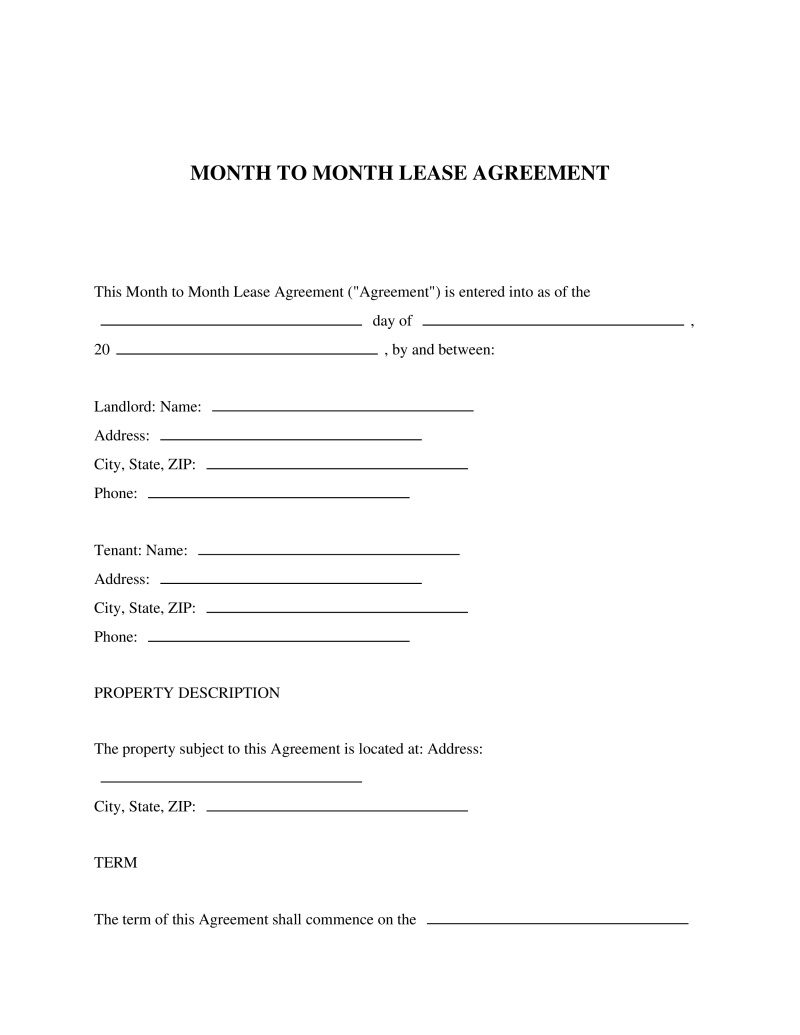A Month to Month Lease Agreement allows tenants and landlords flexibility in rental terms, enabling tenancy to continue on a monthly basis.
Landlord Name
Provide the full name of the Landlord as it appears on the lease or rental agreement. This should include first name, last name, and any title (like Mr., Mrs., or Dr.) if applicable. Accurate information is important for legal purposes, as it identifies who is responsible for the rental property.

Table of Contents
What is a Month to Month Lease Agreement?
A Month to Month Lease Agreement is a dynamic legal document that establishes a rental arrangement between a landlord and tenant on a rolling, monthly basis. Unlike traditional fixed-term leases, this agreement does not specify an end date, providing both parties with the flexibility to terminate the lease under the terms set forth within the document, typically requiring notice of 30 days. This type of lease is ideal for individuals seeking temporary housing or landlords who prefer not to commit to a long-term tenant. It outlines rent amount, payment deadlines, rules for use of property, and conditions under which the agreement may be terminated, ensuring clarity and reducing potential disputes.
Key Features
Important Provisions
- Termination Clause - outlines how either party can terminate the agreement, typically through a written notice period of 30 days.
- Rent Details - specifies monthly rent amount, due dates, and penalties for late payments.
- Use of Property - sets boundaries on how the property can be used (e.g., residential only) and any prohibited activities.
- Maintenance and Repairs - delineates responsibilities of both landlord and tenant regarding property upkeep.
Pros and Cons
Pros
- +Flexibility for both tenant and landlord with easy termination options.
- +Less commitment required compared to standard fixed-term leases.
- +Can be quickly adapted to suit changing rental market conditions.
- +Ideal for tenants seeking short-term living arrangements.
- +Streamlines rental process with clear monthly renewal terms.
Cons
- -Lack of long-term security for both tenants and landlords.
- -Potential for frequent tenant turnover, which could increase maintenance costs.
- -Rent can potentially be increased by the landlord with proper notice.
Common Uses
- Short-term housing for students during an academic year.
- Temporary accommodation for professionals on assignment in different cities.
- Housing option for individuals undergoing transitional life stages, such as divorce or relocation.
- Rental solution for landlords during off-peak seasons to avoid vacancies.
- Flexible leasing option for tenants unsure about their long-term plans.
Frequently Asked Questions
Do you have a question about a Month to Month Lease Agreement?
Example questions:
Not the form you're looking for?
Try our legal document generator to create a custom document
Community Discussion
Share your experience and help others
Legal Notice: Comments are personal opinions and do not constitute legal advice. Always consult a qualified attorney for matters specific to your situation.
Comments (0)
Leave a Comment
No comments yet. Be the first to comment!